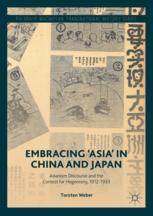

Most ebook files are in PDF format, so you can easily read them using various software such as Foxit Reader or directly on the Google Chrome browser.
Some ebook files are released by publishers in other formats such as .awz, .mobi, .epub, .fb2, etc. You may need to install specific software to read these formats on mobile/PC, such as Calibre.
Please read the tutorial at this link: https://ebookbell.com/faq
We offer FREE conversion to the popular formats you request; however, this may take some time. Therefore, right after payment, please email us, and we will try to provide the service as quickly as possible.
For some exceptional file formats or broken links (if any), please refrain from opening any disputes. Instead, email us first, and we will try to assist within a maximum of 6 hours.
EbookBell Team

4.4
102 reviewsThis book examines how Asianism became a key concept in mainstream political discourse between China and Japan and how it was used both domestically and internationally in the contest for political hegemony. It argues that, from the early 1910s to the early 1930s, this contest changed Chinese and Japanese perceptions of ‘Asia’, from a concept that was foreign-referential, foreign-imposed, peripheral, and mostly negative and denied (in Japan) or largely ignored (in China) to one that was self-referential, self-defined, central, and widely affirmed and embraced. As an ism, Asianism elevated ‘Asia’ as a geographical concept with culturalist-racialist implications to the status of a full-blown political principle and encouraged its proposal and discussion vis-à-vis other political doctrines of the time, such as nationalism, internationalism, and imperialism. By the mid-1920s, a great variety of conceptions of Asianism had emerged in the transnational discourse between Japan and China. Terminologically and conceptually, they not only paved the way for the appropriation of ‘Asia’ discourse by Japanese imperialism from the early 1930s onwards but also facilitated the embrace of Sino-centric conceptions of Asianism by Chinese politicians and collaborators.